- トップページ
- 日本国内での取り組み
- JICA中部
- 「人」明日へのストーリー
- From internship to job offer in Japan - case study

Mr. Mostafa Elmankabady
- Chief Engineer at Kani Construction Co. Ltd
(Former JICA intern at Kani Construction) - Former JICA long-term training program participant, earned Master’s degree in Architecture and Civil Engineering at Toyohashi University of Technology
(JICA training course: ABE Initiative 2018-2020) - He is from Arab Republic of Egypt
We interviewed Mr. Mostafa Elmankabady, former JICA Chubu intern at Kani Construction Co. Ltd regarding his internship experience there, which enabled him to get the job offer.
(Interviewer: Mieko ARAKI, Training Program Division, JICA Chubu)
1)What do you think helped you to get a job at Kani construction?
I think the main trigger was gaining the company’s trust in my personality and my behavior, which I think accumulated during the internship time.
2)Do you think internship experience at Kani construction enabled you to work for there?
I believe the internship played an important role in enabling me getting an offer in KANI Construction, as it allowed me to show my attitude and personality on the long term.
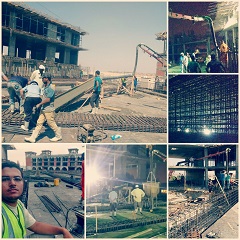
As a construction site engineer in Giza Palace Hotel, Egypt
3)Through your internship experience at Japanese company, was there any mindset changes towards working for a Japanese company?
There were some changes in my way of reaction to some situations. I would say I became more organized in the matter of work progress. That is because Japanese company prefer to keep track of person’s work by recording each step either by report or by work manual. I think it is a bit frustrating but it proved to be better to keep track when a problem happens and it becomes easier to find the source causing the issue.
4)Were you originally planning to work for a Japanese company in Japan?
I wasn’t seriously looking for work in Japan, but was rather more interested in getting into the Japanese working culture and working mindset through participating in the internship, so that would allow me later to make partnerships with Japanese companies at ease. I am lucky working with KANI Construction, as they are more open for discussion, and they give you the green light to express your ideas for probable implementation in the company.
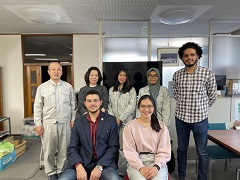
Final day in internship
5)JICA/JICE provides matching events for JICA Ryugakusei and companies. Was it useful for your job hunt activities and others?
Japanese companies are a bit worried, rather picky in accepting foreigners either for internship or work especially the ones with a bit weaker Japanese language. Mainly I would say the matching event in JICA Chubu (See the related links below) was where I met KANI Construction and got in contact with them, where later I got an internship with them, and now I am working there.
6)What is your Japanese proficiency level?
I think it was around N5. (N5 is the most basic level of the Japanese Language Proficiency Test.)
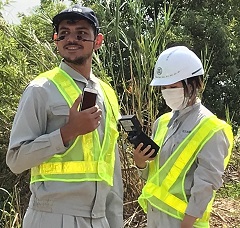
Using eye-tracking technology to revise site safety precautions
How long have you been studying Japanese?
I studied the Japanese basic course at university, and I self-studied after that, so totally I can say 2.5 years, but in slow pace.
Do you write an email or create a document in Japanese?
Since starting to work for KANI Construction, my E-mails have become all in Japanese. Writing a document is a bit challenging, so I am progressing in it a bit by bit.
7)How often do you use Japanese at work?
I do use Japanese daily for basic conversation. Gradually, I am using it for working conversations with colleagues and managers.
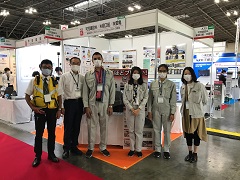
iConstruction EXPO in Nagoya
8)Would you please tell us a surprising experience or struggles after you officially start working at Kani Construction if any?
One of my struggles was the size of the company’s winter uniform, the body size was okay, but the sleeves were short.
Japanese companies usually do not blame for mistakes in the first few months, but after that, they expect more from the employee.
9)If you give any suggestions or requests to Japanese companies, especially for those who are planning to accepting non-Japanese interns or hiring non-Japanese, please share with us.
If a Japanese company wants to hire a foreigner, I would really suggest that the company should have enough flexibility, understanding the person has different culture and behavior. Then, even if some misunderstanding might happen, both parties could pass it through.
10)What kind of competencies, qualification, or mindsets of yours were/are helpful to work for a Japanese company do you think?
I would say the better Japanese language you have, the better communication you can with company. Also, be confident of your skills, but be humble all the time especially while introducing it and yourself to the company, and try to be open to probable changes and suggestions. Eventually, the work is a result of team effort, not only one person. When it comes to entry or intermediate level, Japanese companies are more into the personality more than skills, so put that in mind while addressing a Japanese company for work or internship.
Be clear with your restrictions and worries, so you can discuss with them in a smooth way.
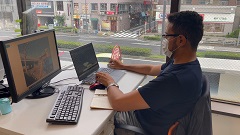
Working in Tokyo Office
11)Any other comments if any:
While in a Japanese company, you will have a chance to learn a lot of skills, such as communication and organizational skills (Japanese way). So spend some time and effort in understanding the reason behind a behavior instead of being judgmental.
Report on Promotion of High-Skilled Foreign Human Resources in the Chubu Region
The interview above (in Japanese) is also on the appendix of the report on Promotion of High-Skilled Foreign Human Resources in the Chubu Region (*1) (中部圏における高度外国人材の活躍促進に関する報告書)(See the related links below) edited by Central Japan Economic Federation(Chukeiren).
According to the report, 35% of the responding companies (*2) currently employ foreign workers and 43% of them are willing to hire them. Major reasons they want to hire foreign students are 1) expertise & different perspectives from Japanese employees (23%), 2) global expansion in business (21%), 3) promotion of diversity (19%) and 4) shortage of human resources (14%).
Top two challenges for them to hire foreign students are 1) lack of communication in languages (25%) 2) different values in working style (e.g. vacations, overtime and lifestyle) (24%) as well as lack of communication in Japanese culture and customs (24%).
The most important employment conditions for companies was 1) Japanese proficiency (59%), 2) knowledge of corporate culture (17%) and 3) long-term employment contract (16%). Ideal Japanese proficiency that companies expect for students was N1 or N2 Level for 76% and N3 for 17%. (2% responded no need for Japanese proficiency if you have English proficiency.) The education they expect the students to have was Japanese (49%) and general Japanese corporate culture (44%).
Among responding companies, 15 % have accepted the interns, and they do it for the purposes of 1) prevention of recruitment mismatch (36%), 2) talent-spot non-Japanese human resources (27%) and 3) promotion of diversity (22%). You can see more details of the report in Japanese here.
*1 “Chubu region” by Chukeiren includes five prefectures that are Nagano, Gifu, Shizuoka, Aichi and Mie.
*2 Respondents: 358 Companies in Chubu area(*1). 24% of companies with less than 100 employees, 46% of companies with more than 100 and less than 1,000 employees and 30% of companies with more than 1,000 employees.
関連リンク
- Africa Business Seminar in Nagoya Highlighting the Potential of African Students | Ministry of Foreign Affairs of Japan (mofa.go.jp)
- 「中部圏における高度外国人材の活躍促進に関する報告書」|一般社団法人 中部経済連合会 (chukeiren.or.jp)
- Master's Degree and Internship Program of African Business Education Initiative for Youth (ABE Initiative) | Countries & Regions | JICA




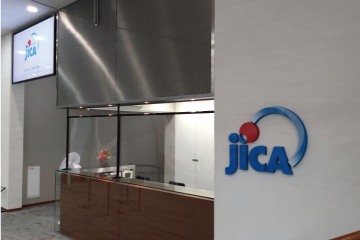

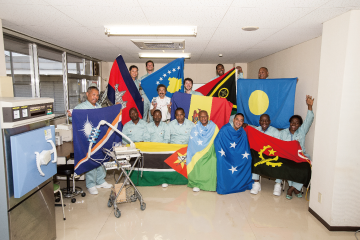

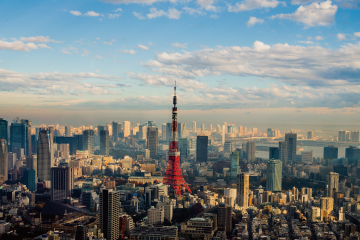



scroll